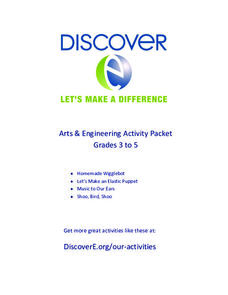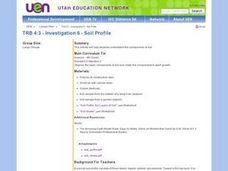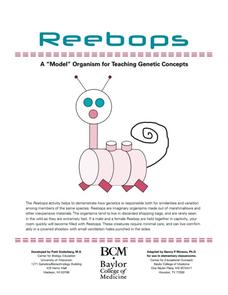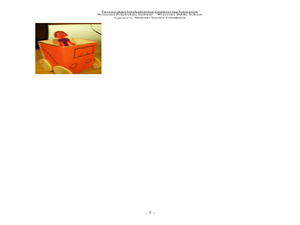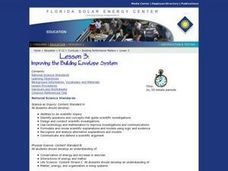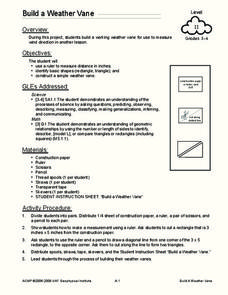National Science Teachers Association
Hop into Action
Young scientists find out what makes amphibians such unique and interesting animals in this simple life science lesson plan. After looking at pictures and discussing the characteristics of amphibians, learners complete a...
Institute of Electrical and Electronics Engineers
Shake it up with Seismographs!
Shake things up in your STEM or earth science classroom when you have small groups construct their own seismographs. A reading assignment on the history of seismographs, the Richter scale, and current technology sets the stage for the...
Kenan Fellows
How Much Heat Can a Phase Change Produce?
Scholars learn about heat release in phase changes. They perform calculations as they compare and contrast a science fiction passage and a home heating application.
American Chemical Society
The Ups and Downs of Thermometers
What has a thermometer earned that your pupils haven't? A degree! After reviewing the previous lessons about molecules and degrees, scholars observe how thermometers work before building their own. The module includes a activity sheet.
American Chemical Society
Does Temperature Affect Dissolving?
When making sweet tea, why do people dissolve the sugar in hot tea instead of cold tea? The class discusses the previous lab and builds upon it. Working in groups, they design an experiment to determine how temperature affects the...
Beyond Benign
Breaking the Tension
The tension builds as learners experiment in your classroom. The 17th installment in a 24-part series has scholars investigate the concept of surface tension. After discovering characteristics of surface tension, they add a compound...
DiscoverE
Arts and Engineering Activity Packet: Grades 3-5
Art and science sometimes go hand in hand. A set of four activities for learners in grades 3-5 teaches engineering concepts as part of art projects. Class members build homemade robots, elastic puppets, musical instruments, and...
SF Environment
Sort and Color!
Sorting is a very important skill that can be used in math and even science. Learners get familiar with some environmentally friendly vocabulary terms as they practice separating objects that can be recycled from those that can't. They...
LABScI
Taxonomy: Who is in My family?
Find similarities in seemingly unlike organisms. The second instructional activity in a series of 12 builds the concept of a taxonomy and explores the use of a dichotomous key. Learners begin in part one by attempting to group a set of...
Discovery Education
Market Research and Design: The Headphone Challenge
Watch augmented reality bring classrooms to life. Scholars work in groups to design, build, and market a new pair of headphones meant for children under three. They use an augmented reality app to show their headphones in action as they...
Curated OER
Stressed and Strained
Learners explore stress and strength in engineering design. In this engineering lesson, students become familiar with terminology associated with stress and strain on building material. They will have a class discuss about how their beam...
Curated OER
Investigation 6 - Soil Profile
Fourth graders study the components of soil. They observe the basic components of soil and relate the components to plant growth. They record color, texture, and kinds of materials on their profile log (light color, denser, grittier -...
Institute of Electrical and Electronics Engineers
Working with Watermills
In collaborative groups, emerging engineers or environmental scientists plan and construct a water wheel or watermill that rotates for a total of three minutes. Everything you need to carry out this lesson is included: objectives,...
National Library of Medicine
Your Environment, Your Health: Runoff, Impervious Surfaces, and Smart Development
Can a sidewalk increase the amount of pollution in local streams? Scholars learn the answer to this question though research and experimentation in the fifth unit in the six-part series. Pupils study runoff, impervious surfaces, and the...
Baylor College
Reebops: A “Model” Organism for Teaching Genetic Concepts
In a sweet simulation, junior geneticists examine the chromosomes of a fictitious Reebop marshmallow animal, combine chromosomes to produce offspring, and then make a model of the resulting Reebop baby. Phenotypes include number of...
Curated OER
Building a Car: Mechanical Engineering
Students use common materials to build a car. In this car building mechanical engineering lesson, students build a car using a milk cartoon and plastic wheels. They discuss what mechanical engineers do and what makes a car run.
Curated OER
Engineering - Solid Rock to Building Block
Learners role-play as engineers designing wedge tools. They devise methods for shaping quarry rocks into pyramid blocks. Following a teacher demonstration, they use materials such as soap, clay, and foam for blocks and wood, plastic,...
Curated OER
Exploring Building Resonance Phenomenon through a Discrepant Event Demonstration
Ninth graders create a model of a city street with various sizes of buildings on it. They use the model to demonstrate the effect of building oscillation during varying degrees of seismic activity.
Curated OER
Building a Bird's Nest
Students identify local birds and their habitats. In this wildlife lesson, students list various birds that live in their area and match the descriptions of the birds to the photos. Students build a diorama of a birds nest.
Curated OER
Improving the Building Envelope System
Students explain the different heat transfer mechanisms and how they influence the building envelope. They develop ways in which the building envelope can be improved and test hypotheses about building envelope designs.
Curated OER
Science to Build On
Students examine how professionals use science to solve practical problems. In this scientific process students divide into groups and complete a class activity on building strategies.
Curated OER
Building a Straw Power Tower
Students build a tower out of straws. In this engineering lesson, students build a tower of straws that must be at least 58 cm tall. The goal is to be the group whose tower can support the most pennies. This lesson gives students the...
Curated OER
Build a Weather Vane
Third graders measure wind direction. In this weather lesson, 3rd graders build a weather vane from a straw, skewer, spool, and flag. Students measure wind direction using their weather vane.
Institute of Electrical and Electronics Engineers
Build Your Own Robot Arm
Learners explore design, construction, and teamwork as they design and develop robot arm at least 18 inches in length using common materials.






